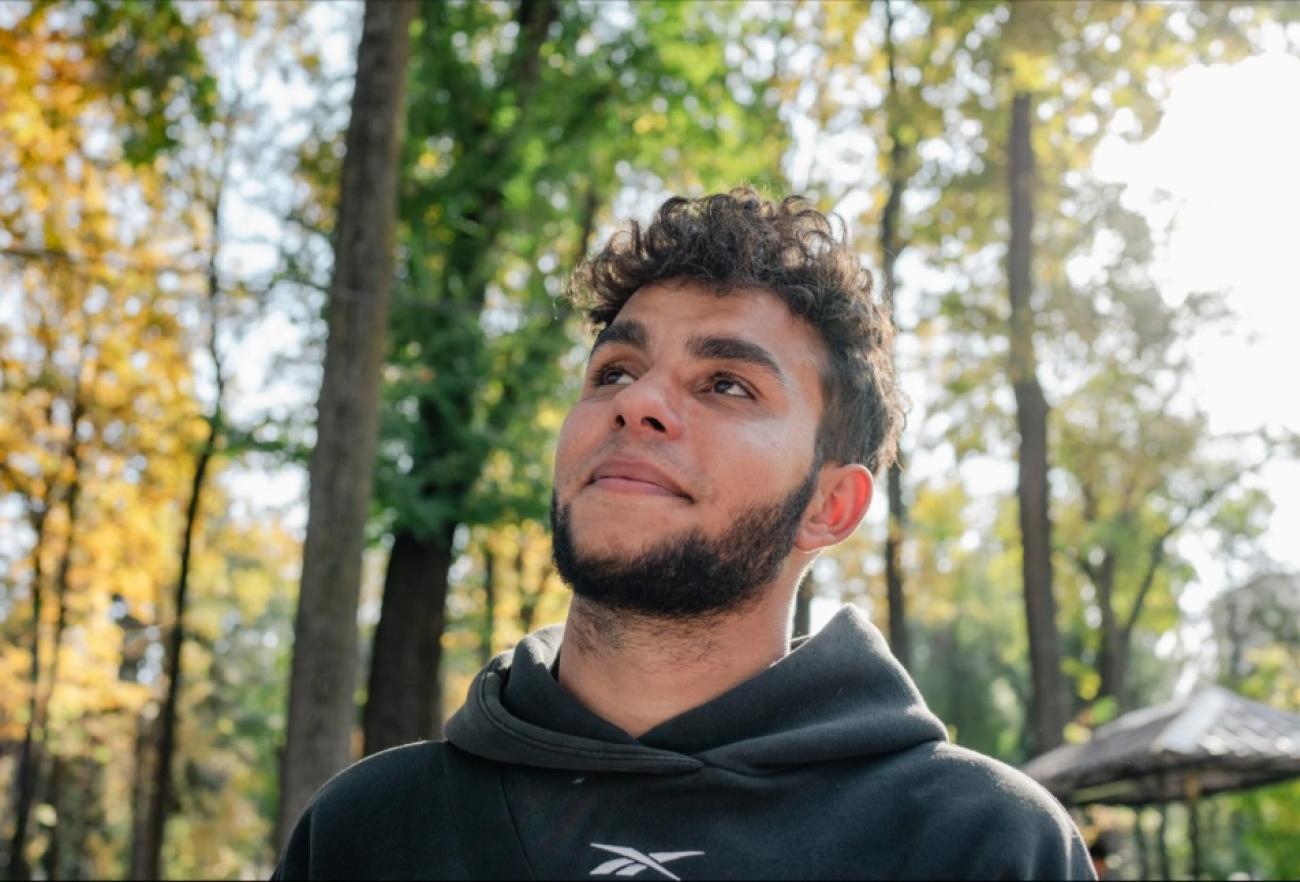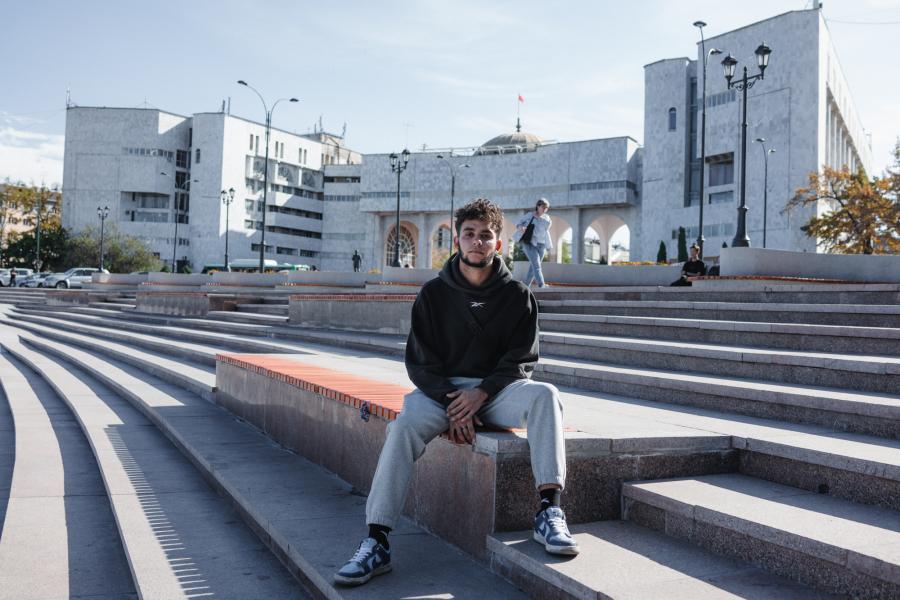“My life changed for the better after getting citizenship.”

Even though Samir in the Kyrgyz Republic had a birth certificate, there was no record of his existence or his nationality.
By Mariko Hall, External Relations
At any age and any stage of life, the death of a parent is distressing. Samir was just 16 years old when his mother passed away, leaving him to fend for himself, his younger brother, and their little sister. Their father too had passed away years earlier. As Samir was still a minor, the authorities soon took their sister into State care. It was only when he turned 18 and tried to gain custody of her, that Samir understood he had no valid identity documents to prove who he was or where he was from. To the Kyrgyz Republic, he was invisible.
Born but still invisible
Samir was born and grew up in the Kyrgyz Republic. Both of his parents were citizens of the country, so he too was considered a citizen and was issued a birth certificate. He went to primary school and high school, played football, and went out with his friends like any other teenager. But everything soon changed.
“When my mom died, it became much harder for us to live, because the only income in the family was my mom’s job,” says Samir. “My little brother and I were finishing school, and then I had to go to work.”
Samir went to the Public Service Centre to get a national ID so that he could work legally and – he hoped – get custody of his sister. As he could not get parental consent, he was told to come back when he was 18. At 18 he returned to the Public Service Centre, submitting required documents, including his birth certificate.
During the verification process however, it was discovered that there was no civil record of his birth in either the database or the archives. Samir’s birth certificate was considered invalid. Samir was not considered as a national of the Kyrgyz Republic or any country.
No access to basic rights
A stateless person is someone who is not considered as a national by any State under the operation of its law. As of October 2024, there were over 34,000 known stateless people in Central Asia. Most are ex-citizens of the former Soviet Union, or their descendants, who have not yet acquired or confirmed citizenship of the independent States. Others are born stateless or became stateless due to gaps in nationality laws, administrative barriers, and mixed marriages.
With no proof of having a nationality or any legal status, stateless people have difficulty accessing basic rights such as education, healthcare, employment, and freedom of movement.
“Because I didn’t have documents, I couldn’t go to hospitals, or clinics, or start learning a profession and work”.
“Because I didn’t have documents, I couldn’t go to hospitals, or clinics, or start learning a profession and work,” says Samir.
“All my friends had already started to get a passport, at that moment they started to study, and I couldn’t. I have a best friend and we are the same age. We wanted, after we finished school, to study together, to study at the same university, but I was not accepted, because I did not have citizenship documents.”
Samir spent years trying to confirm his citizenship, writing and applying to different institutions for help. Unable to resolve the problem on his own, Samir was eventually referred to UNHCR’s partner Legal Clinic Adilet.
No longer invisible
Following a countrywide campaign to identify and map statelessness, in 2019, the Kyrgyz Republic became the first country in the world to resolve all its known cases of statelessness. Efforts to prevent statelessness have continued, with the Kyrgyz Republic since enabling universal birth registration, aligning the definition of a stateless person in the Citizenship Law with international standards, and introducing safeguards against statelessness in citizenship renunciation.
Legal Clinic Adilet advised and supported Samir with the legal process.
“I was collecting documents for my little sister’s guardianship, and at the same time I was dealing with my brother’s documents, he didn’t have a passport either. In fact, it was a very difficult period.”

It was again confirmed that there was no record of Samir’s birth in the archives of any Public Service Centre and that, as per national legislation, he would need to resolve the issue through the court.
Supported by Adilet, Samir filed a lawsuit to establish the fact of his birth. The court ruled in his favour, issuing him a new – and valid – birth certificate that includes the names of his parents. Soon after, Samir received his Kyrgyz Republic passport, officially confirming his citizenship.
1in3: Resolving statelessness
“My life changed for the better after getting citizenship,” says Samir. “When I received my passport, I was very happy, I immediately imagined all the possibilities that would open up before me, that I would be able to do things that everyone used to do and I couldn’t.”
“Now I can go to work officially, I can go to school, I can go to hospitals, I can get a driver’s license.”
Because Samir does not have a steady income, he has not been able to gain custody of his little sister. The parents of a close family friend has instead stepped in, keeping the siblings together.
“My future plans are that I want to go to school now. Because I am already 21 years old, but it is never too late to study. I want to learn a profession, maybe go abroad, work there, travel, learn something new.”
Millions of people around the world are denied a nationality, without which they cannot fully access their human rights and participate in society. As only States can grant or confirm nationality, the cooperation of governments in preventing and reducing statelessness is crucial.
Launched in 2014, the 10-year global #IBelong campaign – generously supported by UNHCR’s biggest donor, the U.S. government and the American People, and partners around the world – aimed to end statelessness by 2024. Over the last decade, Central Asian States, supported by UNHCR, have made great process, documenting the citizenship of more than 210,000 people. One in every three cases of statelessness resolved worldwide is in Central Asia.

Building on the concrete gains and momentum of the #IBelong campaign, efforts and commitments to address statelessness will continue under the new Global Alliance to End Statelessness.
UNHCR continues to support and advocate for the Kyrgyz Republic to adopt Statelessness Determination Procedures, and accede to the two UN statelessness conventions.



